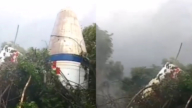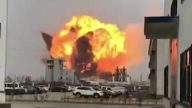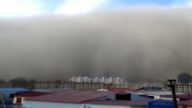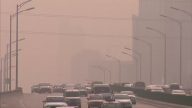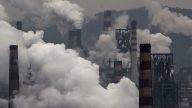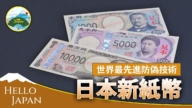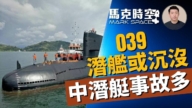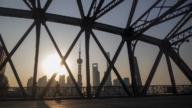【新唐人2014年04月28日讯】今年1到3月,中国平均每周就有一起自来水异味事件。相较于美国的自来水可以生饮,中国的自来水为何总是让人望而生畏呢﹖让我们听听专家的分析。
武汉市政府4月23号晚发布消息说,汉江武汉段水质出现氨氮超标,武汉段两大水厂已停产,全市260平方公里面积停止供水,30多万居民和数百家食品加工企业的用水将受到影响。
4月22号是“世界地球日”,中共国土资源部发表了一份年度报告,报告显示:在全国203个地市级行政区开展的地下水水质检测中,有近六成的检测点水质,呈“较差”或“极差”状况,有重金属超标现象。
另据隶属《新华社》的《瞭望东方周刊》最新一期封面报导,今年1到3月全中国范围内,媒体曝光的自来水异味事件有10多起,平均每周一起。
北京水污染环保自愿者张峻峰:“中国的工业化的进程,可以说当时制定的经济发展政策,缺乏远见,造成了早期的快速发展阶段所存留的很多环境危害,在现阶段是突发的显现,因此形成了比较长期的污染局面,也就是我们今天所见到的,各地所爆发的各种污染的恶行事件的展示。”
据了解,美国纽约的哈德逊河在上世纪六十年代,也曾遭受工业的严重污染,后经过持续几十年的清污整治,逐渐好转。如今哈德逊河的水质基本清澈。
而美国的自来水,在很多年前就达到可以生饮的标准,如果居住城市的自来水公司属于公营企业,则更值得信赖,因为公营企业的水质监测报告都是透明公开,民众有很多管道可以监控。
张峻峰:“西方国家的环境污染在当年虽然也有类似于很恶劣的现象,比如像日本的水俣病、英国的大雾,但是这样的一些国家正赶上当年的环境保护运动的兴起,他们通过重新划定经济的不同环节的一些上下游之间的比例,使得在生产链条上获取的利益,能够反过来去修复原先的一些环境破坏的状况,因而形成了目前我们所看到的,西方国家生态表现还是非常良好的。”
4月16号,有一则美国yabo88官网令中国百姓相当震惊。美国俄勒冈州波特兰市,由于一名青少年在蓄水区小便,波特兰当局以“降低公众健康风险”为由,决定排放总量达1.4亿公升的全部蓄水。
张峻峰:“西方对于权利的重视程度,远远高于中国大陆对个人人权的重视程度,我们基本上是对个人的身体的损害,精神的损害重视程度,要远远低于对整体发展目标的追求的一种希望或者渴望。中国毕竟极贫极穷了很长的时间,对于很多的项目是急于求成,并且是铺开的来进行。”
美国生态学家武业钢对《自由亚洲电台》表示,在中国,当地上污水排放被禁止或限制之后,有一些企业将污染偷偷排入地下,这是在做断子绝孙的事。
北京水污染专家王永晨:“最主要是罚的太轻,这些企业的排污,犯罪成本太低。他们老百姓有发言权,比如英国要建一个企业,但是当地老百姓说,打破了他们的平地,影响他们的生活,所以投票反对掉了,中国老百姓没有这个权利,全是领导决定的。第二个,他们有严格的法律,如果(企业)把污水排到河里,他让你倾家荡产。”
北京水污染专家王永晨表示,中国不仅排污处罚太轻,还存在官商勾结的问题。
王永晨:“我们前两天走金沙江,洗矿的水就直接留在河里,而给他们的惩罚——关了、改了以后才可以开,可是谁去监督他们,排污的信息,老百姓知道不知道,环保部门跟他的关系到底是什么。在中国,很多这样的惩罚不清,信息不公开,罚的力度不够。”
武业钢指出,相较于美国,中国人口众多,经济总量庞大,再加上法制不健全,基本上还是一个人治的社会,这些因素都加大了中共治理水污染的难度。
采访/朱智善 编辑/陈洁 后制/孙宁
Can China’s Water Pollution Be Any Worse?
Between January and March 2014, incidents of tainted water in
China occurred once a week on average.
Compared to the drinkable tap water in the United States,
why is water in China always a such an issue?
Let’s hear the experts’ analyses.
On April 23, Wuhan authorities announced ammonia levels
in water exceeded national safety levels.
Two Wuhan water plants were shut down, affecting an area
of 260 square km and more than 300,000 residents as well as
hundreds of food manufacturers.
The Chinese Communist Party (CCP) ministry of land and
resources released a report on Earth Day, that from a survey
of 203 cities 60% had “relatively poor” or “very poor” water
underground with heavy metals exceeding national safety levels.
The latest cover story of Chinese Oriental Outlook, a subsidiary
of the Xinhua News Agency, reported the number of tainted
water incidents in the first quarter of this year.
With over10 cases of tainted water incidents in China in 2014,
thisis an average of one case a week.
Zhang Junfeng, Beijing environmentalist: “Industrialization
in China has proceeded with an economic policy that lacked
vision and has created many hazards to Nature.
The damage has emerged after rapid development of the
industry and prolonged pollution.
That’s why we are seeing outbreaks of all kinds of pollution
throughout China now."
By contrast, New York’s Hudson River was also
seriously polluted in the 1960s.
However after decades of persistent decontamination and
remediation, it gradually improved.
Today, the Hudson River is basically clean and clear.
The tap water in the United States has been drinkable
for many years.
Most U.S. city water is trustworthy because of the open and
transparent water quality reporting, which is subject to
supervision through various channels.
Zhang Junfeng: “Many countries have had serious pollution
issues such as the Minamata disease in Japan, and fog in the
United Kingdom.
However, the environmental protection movements have helped
to adjust the economic plans to repair the damages using profit
obtained through the industry chains.
That’s why we see the ecology has been restored
quite well in those countries."
Portland of Oregon decided to dump 140 million liters of water
from its reservoir after a teenager was caught urinating into the
water supply.
Zhang Junfeng: “The West has a much higher respect of human
rights than us.
We have much lower standards in physical and mental health
than the state development.
After being so poor for so long, many projects have been hurried
and conducted without reservation."
Ecologist Yegang Wu told Radio Free Asia that when local
sewage discharge is prohibited or restricted, it is wrong for
those industries to secretly release waste water underground.
Wang Yongchen, Beijing environmentalist: “It is mainly
because the fines are too little.
The cost to the industry which released the pollutants or
committed the crime is very low.
In contrary, take England as an example,
people have rights.
People could vote against the industry which affected their land
and their lives.
But, Chinese don’t have that right. It’s all
decided by the CCP leadership.
Also, China does not have a law that would bankrupt
the industry that dumped the waste into the water."
Beijing environmentalist Wang Yongchen said as well as light
penalties, there are also problems of collusion in China today.
Wang Yongchen: “We went to Jinsha River the other day
and found the water that was used to rinse coal was directly
discharged into the river.
The punishment was to shut the facility
down until it’s corrected.
But, who will supervise? Do people know about
the discharge?
What’s the relationship of the environmental protection
department with the industry?
In China today, there are many cases like this, unclear
understanding, lack of transparency, and light punishment."
Ecologist Yegang Wu indicated that compared to the United
States, China’s large population, big economic volume, and a
unhealthy legal system, i.e., a society ruled by the CCP,have
all increased the difficulty of controling water pollution.
Interview/Zhu Zhishan Edit/ChanJie Post-Production/SunNing


